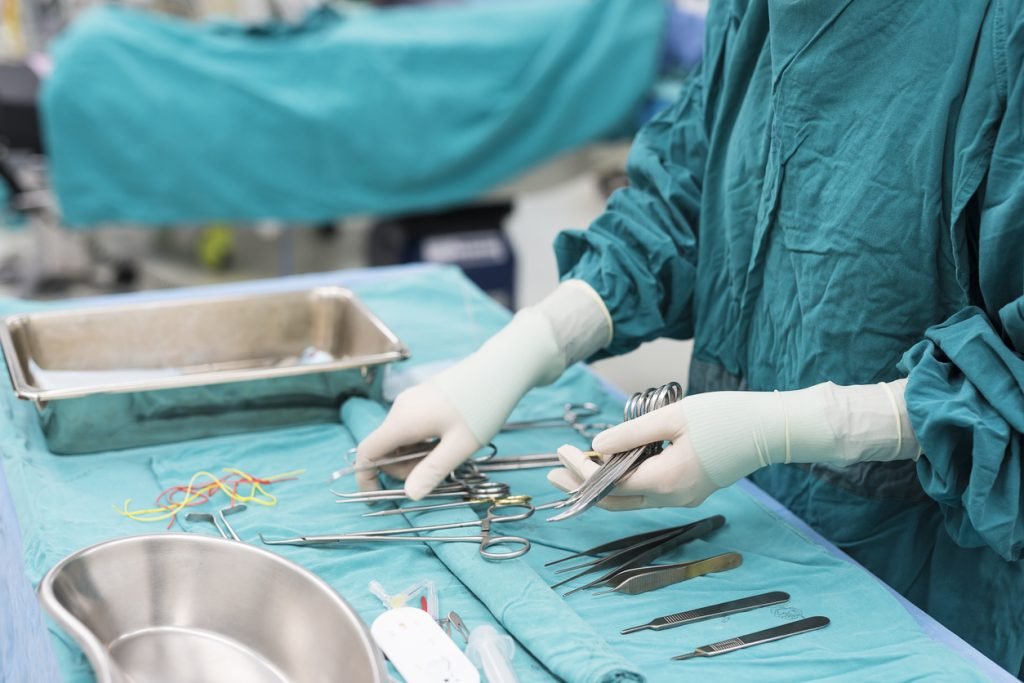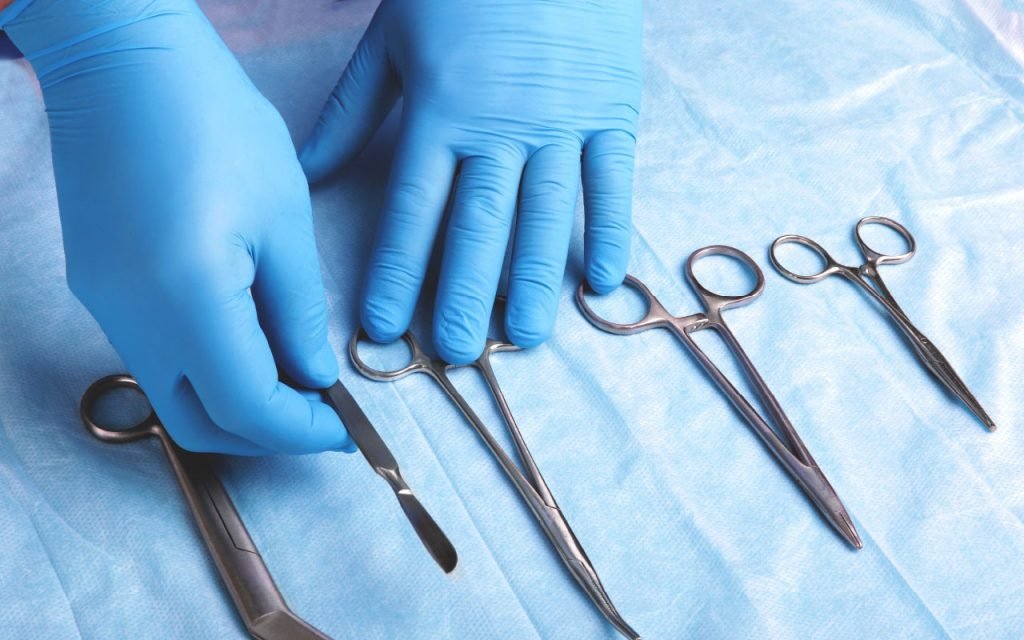If you’ve ever wondered how surgeons can do precise, life-saving operations, the answer is that they are very skilled and have the right tools. General surgical tools are the unsung heroes of the operating room, though. These tools do the hard work, both in terms of lifting and in terms of getting things done.
In this article, we’ll talk about why it’s important to have the right surgical tools, look at different types and their uses, talk about how to pick good tools, and cover the basics that people often forget, like how to use them, how to take care of them, and what to ask when you buy them.

Why the Right Surgical Tools Are Important
Let’s start with a simple fact: no matter how good a surgeon is, they can’t do surgery with bad tools. Think about trying to cut a tomato with a butter knife. That’s what it’s like to try to do surgery with a tool that isn’t sharp or doesn’t fit.
High-quality, function-specific tools not only make things more accurate, but they also cause less damage to tissue, shorten the time it takes to perform surgery, and help patients recover faster.
To sum up, the right tools lead to better results.
A full list of the different types of surgical instruments and what they are used for
Let’s now talk about the different types of instruments and what each one does.
Tools for cutting and dissecting
- As the name suggests, these tools are used to cut and separate tissues.
- Scalpels are the best tools for making clean, precise cuts. A lot of the time, this is done at the start of procedures.
- Surgical scissors come in many shapes and sizes, including curved, straight, blunt, and sharp. They are used to cut tissues or sutures.
- Bone chisels and saws are tools that orthopaedic surgeons use to cut through bone.
- These tools must be very sharp and easy to control in order to be accurate.
Holding and Grasping Tools
These tools are like extra fingers for a surgeon.
- Tissue forceps are great for holding delicate tissues without hurting them.
- Needle Holders are important for sewing because they make sure that surgical stitches are put in the right place.
- Towel clamps are used to hold surgical drapes in place or, in some cases, to hold tissue in place for a short time.
- Tools for grasping should have a grip that doesn’t slip and be made to fit the hand.
Suction Devices and Retractors
Surgeons can’t fix things they can’t see.
- Manual Retractors: These are held by assistants to pull tissues out of the way and keep the surgical site open.
- Self-Retaining Retractors stay in place by themselves, so you can use your hands.
- Suction devices get rid of blood and fluids so the area stays clear and easy to see.
These are very important for being able to see and get to things during surgery.
Other Important Surgical Tools Probes are used to look at wounds, check the depth of cavities, or look at tracts.
Dilators are tools that slowly make openings or ducts bigger.
Elevators are tools that lift or separate layers of tissue. They are often used in dental and orthopaedic surgeries.
Each of these tools has a unique but important job to do.
Picking Good Tools for Great Clinical Work
You don’t have to be an instrument technician to tell the difference between good and bad instruments, but it helps to know what to look for.
Important Features of High-Quality Instruments
- Material: Stainless steel that is safe for surgery is a must. For the best durability, look for steel from Germany or Japan.
- Precision: The edges must be perfectly lined up. Hinges and joints should work without any problems.
- Finish: Matte or satin finishes make it easier to see when the lights are on.
- Balance: A tool that is well-balanced makes it easier to use and less tiring on the hands.
Accuracy vs. Longevity
Some delicate tools are very accurate but also very fragile. Some are stronger but may not be as precise. Know what the procedure needs and choose accordingly.
The Benefits of High-Quality Surgical Tools
It’s not just about brand pride when you buy high-quality tools; it’s also about how they affect patients.

Better Results for Patients
With high-quality tools, you can make cleaner cuts, cause less trauma, and make repairs that are more accurate. All of these things lead to shorter healing times and fewer problems.
How to Make the Operating Room More Efficient
Tools that are well made don’t break, jam, or need to be adjusted all the time. That means less time fumbling around and more time paying attention to the patient.
The Importance of Handling, Cleaning, and Sterilising
If you don’t take care of your tools, they will break down.
Standards for Sterilisation
Instruments must be cleaned and sterilised very well between uses. This usually means:
- Cleaning with sound waves
- Autoclaving
- Looking at something closely
Before you use each tool again, it must be completely dry and, if needed, oiled.
Best Practices for Handling
- Only use tools for what they were made for.
- Don’t use forceps to hold needles (this is a common mistake).
- Put instruments in trays that protect them to keep them from getting damaged
Handling things correctly makes them last longer and keeps them working well.
What to Ask Your Supplier: A Buyer’s Guide
It’s not just about the price when you pick a supplier. If you ask the right questions, you’ll get more than just tools; you’ll also get peace of mind.
Quality of the Material
- Is the steel good enough for surgery?
- Does it resist corrosion?
Where does it come from?
Compliance and Certification
- Are the tools CE-marked or approved by the FDA?
- Does the supplier have an ISO 13485 certification?
This is very important for hospitals that have to follow international rules.
Warranty and Support: Is there a policy for returns or replacements?
Does the supplier offer services to sharpen or realign?
Having good after-sales service is a big plus.
Last Thoughts
Surgery is a delicate, exact, and high-stakes process. The tools you use should show how serious the job is. Every tool in the surgical tray has a job, from cutting and dissecting tools to grasping and retracting devices. When that job is done well, lives are saved.
When you buy high quality surgical tools, you’re not just getting steel and hinges; you’re also getting safety, accuracy, and quality.
faqs
What are general surgical instruments used for?
They’re used for cutting, holding, retracting, and suturing during surgeries—each tool serves a specific purpose for safe and precise procedures.
Why is stainless steel used in surgical instruments?
It’s durable, rust-resistant, and easy to sterilize, making it ideal for repeated surgical use.
What should I look for when buying surgical instruments?
Check for high-quality materials, certifications (like CE or FDA), precise design, and good after-sales support.
How often should surgical instruments be sterilized?
After every single use, using proper cleaning and autoclaving procedures.
Can the same instrument be used for different procedures?
Some can, but many are procedure-specific. Always use the right tool for the right job.
